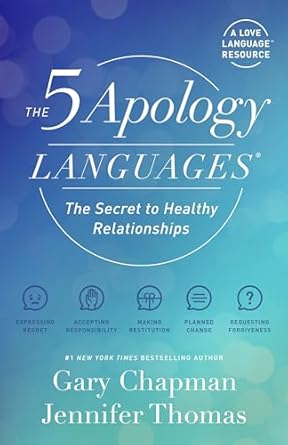Editor’s Note: In my previous post, we explored the transformative power of forgiveness as a pathway to healing and vitality. This week, we’re diving into another crucial aspect of fostering healthier relationships—making amends that truly work. These ideas, inspired by Gary Chapman’s “Five Apology Languages,” offer practical steps to connect more deeply, promote forgiveness, and cultivate a harmonious environment. Additionally, these concepts, inspired by my book Create The Vitality You Crave: Epigenetics 101 to Unlock Your Healing Power, offer a pathway to align your spiritual, emotional, mental, and physical dimensions. Together, they unlock a deeper sense of joy, healing, and vitality. And, isn’t that the best gift we can give during this holiday season!
True vitality is born from the choices we make with intention—the choices to heal, emotionally, mentally and physically.
True Vitality also involves embracing the present, releasing what no longer serves us, and nurturing the joy that carries us forward. Presence invites us to savor the beauty of the now, while forgiveness frees us from the emotional weight of resentment and regret. Together, they empower us to live with grace, aligning us with our higher selves and opening the door to resilience, compassion, and personal growth.
When we approach life with mindfulness and the courage to forgive, we awaken a deep well of vitality that touches every part of who we are, even, as I mentioned last week, on a cellular and DNA level. This is the power of intentional living: it transforms our energy, heals our wounds, and nourishes us in ways we never thought possible.
Today, grant yourself the gift of healing. Release what’s holding you back, step into the present, and embrace the radiant, authentic version of yourself waiting to shine. Choose presence. Choose forgiveness. Choose vitality.
Forgiveness: The Greatest Gift You Can Give This Christmas
Christmas, Hanukkah or Kwanzaa have traditions of giving, and while gifts under the tree are cherished, there is one gift that holds even more power—forgiveness. In a season where love, peace, and goodwill are celebrated, forgiveness has the ability to heal wounds, restore broken relationships, bring true peace to our hearts, and heal us physically! But how can we create an environment of forgiveness, especially if we’ve been the ones to offend others?
The Bible reminds us that if we’ve wronged someone, we must “clean it up” and seek reconciliation (Matthew 5:23-24). This is where the Five Apology Languages can play a crucial role. Understanding these apology languages can help us genuinely make amends, demonstrate heartfelt remorse, and create the space for healing and forgiveness to flow freely.
This gift giving season, let’s embrace the transformative gift of forgiveness—not only as something we give to others, but as something that heals and frees us as well. Exploring how forgiveness can be the greatest gift we give this holiday season and how the Five Apology Languages can guide us in offering this gift with sincerity and love.

Embracing Forgiveness to Heal and Reconcile
At the heart of these holiday traditions is the message of love, peace, and reconciliation. It’s a time when families come together, but it’s also a time when old hurts and unresolved conflicts can resurface. Forgiveness is the key to restoring peace and mending broken relationships, both with others and ourselves. If you are a Christian, celebrating Christmas, we are called not only to celebrate the birth of Christ, who brought the ultimate gift of forgiveness but also to embody that forgiveness in our own lives.
Forgiveness allows us to release the weight of past offenses and create space for new beginnings. But how do we forgive, and how do we ask for forgiveness when we’ve wronged someone?
Making Amazing Amends that Heal
Have you ever tried to apologize or make amends, and it just didn’t land? The person on the receiving end didn’t seem to hear the apology. Perhaps you felt that you’d tried until you were “blue in the face,” and it still just didn’t go anywhere. That could be because you were not speaking their apology language. This is where a new tool can help.
Gary Chapman, a well-known author, speaker, and counselor, is perhaps best known for his book The Five Love Languages. He has since written about apologies and forgiveness in relationships, outlining what he calls the “five apology languages.” In his book The 5 Apology Languages: The Secret to Healthy Relationships co-authored with Jennifer Thomas, Chapman presents a framework for understanding how individuals give and receive apologies. This concept of apology languages can be applied to various types of relationships, including romantic partnerships, friendships, family dynamics, and professional interactions. By identifying and speaking the appropriate apology language, individuals can strengthen their connections, rebuild trust, and foster healthier relationships overall. Let’s take a look at these five apology languages and how they can help you make amends that truly work.

1. Expressing Regret
Expressing regret is more than just saying “I’m sorry.” It involves acknowledging the specific hurt or harm caused by one’s actions and demonstrating genuine remorse for it. This apology language requires empathy and understanding of the other person’s feelings. When someone values the expression of regret, they seek validation that the other party truly comprehends the impact of their behavior. This acknowledgment helps validate the emotions of the injured party and lays the groundwork for healing. It’s essential for the apology to be sincere and heartfelt, showing that the person apologizing truly understands the pain they’ve caused and regrets their actions.
For example, if you missed an important event for a friend, a meaningful apology would be: “I am so sorry I missed your graduation. I know how important this day was for you, and I deeply regret not being there to celebrate with you. I understand that my absence hurt you, and I am truly sorry for the pain I’ve caused.”
2. Accepting Responsibility
Accepting responsibility means owning your actions without making excuses or shifting blame. This apology language emphasizes accountability and integrity. When an injured party values the act of accepting responsibility, they appreciate when the person apologizing acknowledges their role in the situation and takes full accountability for their behavior. It’s not enough to merely acknowledge that a mistake was made; individuals who value this apology language expect genuine remorse and a commitment to making things right. Taking responsibility requires humility and courage, as it involves admitting fault and being willing to face the consequences of one’s actions.
For instance, if you made a mistake at work that affected a project, you could say: “I accept full responsibility for the errors in the project report. I realize my oversight caused delays and additional work for everyone involved. I am sorry for the inconvenience and will take steps to ensure this doesn’t happen again.”
3. Making Restitution
Making restitution involves taking concrete steps to repair the damage caused by your actions. This apology language focuses on actions rather than words. When an injured party values the act of making restitution, they expect tangible efforts to right the wrongs committed. This may include offering to fix or replace what was damaged, reimbursing for any losses incurred, or taking proactive measures to rectify the situation. Making restitution demonstrates sincerity and commitment to making amends, showing the other person that their well-being and satisfaction are paramount. It’s about actively demonstrating care and concern for the person who was wronged and taking responsibility for the consequences of your actions.
For example, if you broke a friend’s valuable item, a suitable apology might be: “I’m truly sorry for breaking your vase. It was careless of me, and I understand it has significant value to you. I would like to replace it or compensate you for it. Please let me know how I can make this right.”
4. Genuinely Repenting
Genuine repentance goes beyond surface-level apologies and involves a sincere commitment to changing your behavior. This apology language also focuses on actions rather than words. When an injured party values genuine repentance, they expect to see concrete evidence that the person apologizing is genuinely remorseful and willing to make efforts to avoid repeating the same mistakes in the future. This may involve seeking counseling, undergoing personal growth and development, or implementing strategies to prevent similar situations from arising. Genuine repentance requires self-awareness, humility, and a willingness to confront and address your shortcomings. It’s about demonstrating through actions that you are committed to becoming a better person and repairing the damage caused by your actions.
For example, if you’ve repeatedly been late to meetings, a genuine apology might include: “I’m sorry for being late again. I realize this is a recurring issue, and it’s disrespectful of your time. I am taking steps to address my time management skills, including setting reminders and adjusting my schedule, to ensure this doesn’t happen again.”
5. Requesting Forgiveness
Requesting forgiveness involves directly asking for forgiveness from the person who was wronged. This apology language focuses on closure and reconciliation. When an injured party values being asked for forgiveness, they find validation and healing in extending forgiveness to the other person and moving forward with the relationship. This step is crucial for both parties to experience closure and move past the hurt and resentment caused by the offense. Requesting forgiveness requires vulnerability and humility, as it involves admitting fault and asking for mercy and understanding from the injured party. It’s about acknowledging the pain caused and expressing a genuine desire to restore the relationship to a place of trust and mutual respect.
For instance, if you’ve hurt a partner’s feelings during an argument, you might say: “I’m sorry for my harsh words. They were hurtful and uncalled for. I regret causing you pain, and I ask for your forgiveness. I value our relationship and want to work on being more respectful in our disagreements.”
Determining the Right Apology Language to Use
At some point in almost every relationship, someone might have a bad day, be upset, and feel hurt or offended. You may want to clean it up, but here’s the challenge—how do you know someone’s apology language to actually get the apology right, so it lands for them? First, start with Chapman and Thomas’s apology language quiz to understand your own apology language. Then share it with others you are in a relationship with. Alternatively, you can ask the person you’ve harmed what sort of apology they need.
If that doesn’t work, Chapman and Thomas recommend a foolproof approach—use them all! They recommend taking a few minutes and writing, typing, or dictating a short apology that uses all of the five apology languages. It can be short and to the point, but touch on all of them. The point is of course your intention—to make amends and to heal the relationship. Even if your apology is not perfect, most people can still feel and hear your sincerity.

How to Use the Five Apology Languages to Make Amends That Work
Using all five apology languages can create a comprehensive and effective apology. Here’s how you can structure an apology that incorporates all elements:
- Expressing Regret: “I am deeply sorry for [specific action] and the hurt it caused you.”
- Accepting Responsibility: “I take full responsibility for my actions and understand they were wrong.”
- Making Restitution: “I want to make this right by [specific action]. Please let me know how I can compensate for the damage.”
- Genuinely Repenting: “I am committed to changing my behavior and have already started [specific steps] to ensure this doesn’t happen again.”
- Requesting Forgiveness: “I hope you can find it in your heart to forgive me. Your forgiveness means a lot to me.”
For instance, if you’ve offended a friend, you might say: “I am deeply sorry for not being there when you needed me (expressing regret). I take full responsibility for not prioritizing our friendship (accepting responsibility). I want to make it up to you by planning a special day together to show you how much I value our friendship (making restitution). I am also working on balancing my time better to be more present in our relationship (genuinely repenting). I hope you can forgive me and allow us to move forward together (requesting forgiveness).”
Conclusion
In conclusion, the Five Apology Languages offer a powerful and transformative tool for fostering deeper connections and healing within our relationships. Just as Christmas is a time for giving, the gift of a sincere apology can create lasting change, allowing us to reconcile with others and restore peace in our hearts. By incorporating all five apology languages—expressing regret, accepting responsibility, making restitution, genuinely repenting, and requesting forgiveness—we can ensure our apologies resonate and truly bring healing to those we’ve hurt.
As we approach this holiday season, let us remember that forgiveness is one of the greatest gifts we can offer. Not only does it heal past wounds, but it also frees us to move forward with renewed peace and vitality. By embracing the Five Apology Languages, we can create an environment of understanding, compassion, and reconciliation, making this Christmas a time for healing, growth, and restoring relationships. Let forgiveness be the gift that transforms this season into one of true peace and love.
“If you have enjoyed reading this blog, and want to take a deeper dive, then you will love my new book Create The Vitality You Crave: Epigenetics 101 to Unlock Your Healing Power. You can order on Amazon by clicking here.

